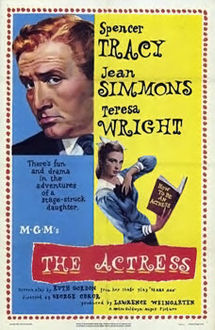
THE ACTRESS
US, 1953, 90 minutes, Black and white.
Spencer Tracy, Jean Simmons, Teresa Wright, Anthony Perkins.
Directed by George Cukor.
The Actress is based on the life of Ruth Gordon, who also wrote the screenplay. Its credits are very strong.
Direction is by George Cukor, prominent since the 1930s with directing a number of films, especially for actresses. He directed Katharine Hepburn in Sylvia Scarlett as well as in The Philadelphia Story. He directed Judy Holliday to an Oscar in Born Yesterday. He himself was to receive an Oscar for his direction of My Fair Lady in 1964.
Jean Simmons who had established herself as a promising young actress in Britain in the 1940s (Hamlet, Adam and Evelyn, Uncle Silas) moved to Hollywood with her then husband Stewart Granger and immediately began to appear in a great number of films (small films like Angel Face, Beautiful But Dangerous as well as spectacular films like Young Bess and the first Cinemascope film, The Robe). She impersonates the young Ruth Gordon and Spencer Tracy and Teresa Wright are her parents. Anthony Perkins is the young man in her life. Perkins was also at the beginning of his long career.
Ruth Gordon wrote a great number of screenplays, especially with her husband Garson Kanin. During the 1960s she began to appear in a great number of films, a small woman with a strident voice but a strong screen presence. She won an Oscar as best supporting actress in 1968 for her performance in Rosemary’s Baby. She appeared in such cult films as Every Which Way But Loose as well as Harold and Maude.
1. How entertaining a human story, family story, period melodrama, theatre story, piece of Americana?
2. Was it evident the film was based on a play? Its title, years ago? The stage characterizations, the contrived scenes?
3. The film as being the early story of the well-known actress Ruth Gordon? The screenplay written by her husband? From her own play? An authentic atmosphere of the story of an ambitious young girl to become an actress?
4. The importance of the stars and their status, skills? interaction? Satisfying drama?
5. The black and white photography and its presentation of early 20th century Boston and Massachusetts, the interiors and the exteriors, home, theatre, dances etc.? The operetta sequences as giving the period flavour?
6. Themes of ambitions and hopes, a young girl in the early 20th century, expectations for girls and their careers, the place of the theatre and people's looking down on it? Family, education? Driving ambition?
7. The sketching in of the background, period America, manners, the father with his sailing ship background, poverty and his styles and expectations for courtship, physical exercise? The decor, clothes? The sense of propriety?
8. The impact of the opening with Ruth's dreams about the theatre, the long operetta sequence and the focus on the actress transferring to the dress fitting and Ruth's hopes and dreams? The actress and her influence on Ruth, the photo and the letter, sharing it with her girlfriends and the giggling girls' reaction, the dancing and the singing? Its leading to more serious interviews? Ruth's interviews and her disappointment? The transition to achievement and career and success?
9. The expectations of parents about a daughter going on the stage - her mother loving her daughter and encouraging her yet apprehensive about her father? Her fears of telling her father? The irony in the understanding way in which he listened to her case even though it went against his hopes for her physical culture career? The reputation of the theatre at the time?
10. The presentation of the Jones family - the bonds, the dominance of the father, the many sequences highlighting costs and poverty, the presence of the cat and various reactions to it (what it ate)? The speculations about the future, the mother and her encouragement of her daughter, the father and the details of his plans for her physical culture work? The importance of the scene when he began to enrol her, the surprise of his understanding of her hopes? His coping with her disappointments and helping her and leading her towards a future?
11. Clifton Jones and his background of the sea, gruff manner, money preoccupations, his severe way of speaking to wife and daughter, telling old stories to Ruth's girlfriends, the long physical culture sequence and the humour of his exercise, the comments behind Ruth and her mother, his losing his trousers? The humorous phone sequence and his getting used to the telephone? His job? A Spencer Tracy performance with its skills and nuances? Matched by Teresa Wright's subdued style as the wife? Her place in the family, help, fussing, mention of God, delight in her husband's performance at the physical training, anxious about her daughter, anxious about Fred?
12. How convincing was Jean Simmons as Ruth as a young girl, dreams, identifying with the actress? Girlish, dances, giggling with her girlfriends, idolising the actress and her photo? The exaggerated way of speaking so emotionally about her career, giving up her schooling? Her reaction to Fred, their dates together, the auditioning for her parents and trying to prove she was an actress? The sequence with Fred when the parents were noisy upstairs and her humiliation? The proposal and its effect on her? Her sadness at the interview and it not fulfilling her hopes? The transition to fulfilment and success? The performance as convincing us that she would become an important actress?
13. The humorous American comedy touches - the phone sequence, the physical training, Fred's visit, the audition?
14. How satisfying was the resolution - the real look at the life of the theatre and the actress? Ambitions, being alone, the support of her family?
13. How satisfying a film reflecting human aspirations, opportunities, circumstances and support?